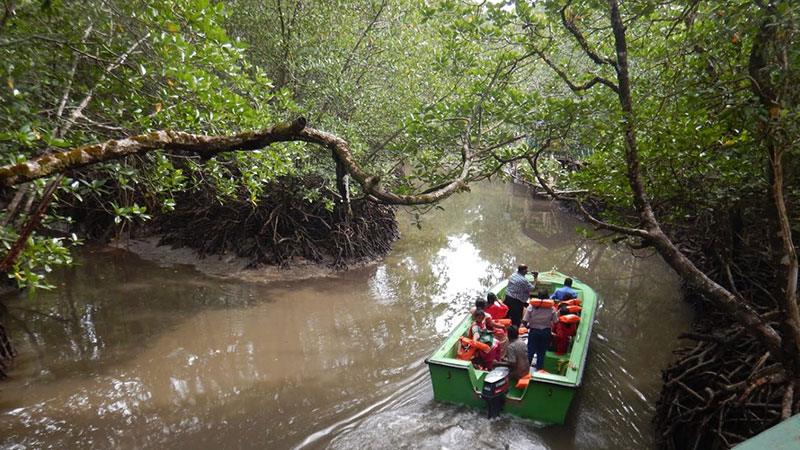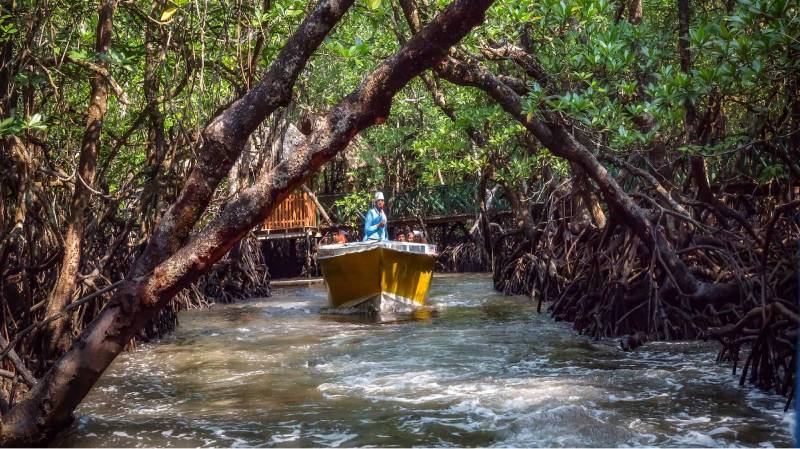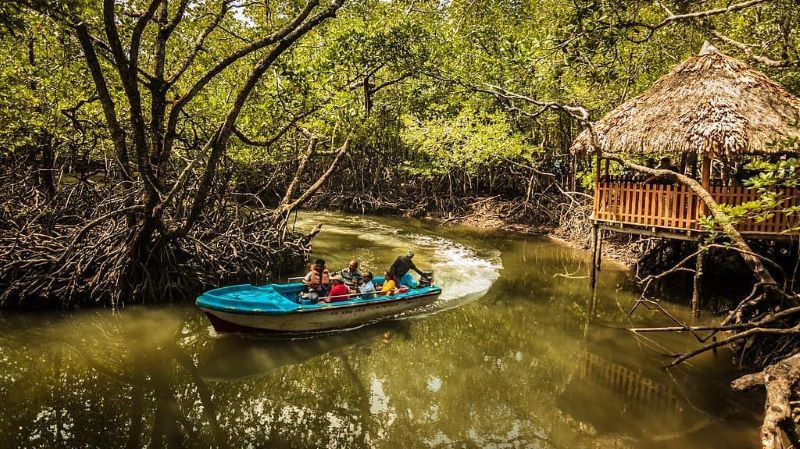The world is full of enchanting wonders that captivate the human spirit, but few are as awe-inspiring as Baratang Island. Located in the middle of the Andaman archipelago, Baratang Island is a hidden gem often overlooked by tourists. This place is a perfect paradise for nature lovers, boasting a rich variety of wildlife, breathtaking landscapes, and a rich cultural heritage.
With its serene landscapes and otherworldly charm, it captures the hearts and imaginations of those who venture here, offering an experience that resonates long after the journey has ended.
What and Where is Baratang Island
The enchanting Baratang Island forms part of the Indian union territory of the Andaman and Nicobar Islands. Situated northeast of the capital city of Port Blair, Baratang is a tranquil and serene destination that remains relatively unexplored, thus maintaining its pristine charm. The island stretches over an area of about 242.6 square kilometres, providing ample space for its natural wonders to unfold. While it is quite popular among tourists these days, the island still maintains its place as one of the best offbeat and remote locations in the Andaman Islands.
The island's population mainly consists of locals involved in farming and fishing. There's a strong sense of community on the island, which manifests itself in the warm hospitality extended to visitors. Despite being remote, the island has facilities that ensure a comfortable stay for visitors, from basic amenities to decent accommodation options.
The Rich Flora and Fauna of Baratang Island
Baratang Island’s topography is varied, with lush green forests, stunning beaches, intriguing mangrove creeks, and fascinating geological formations. Its tropical climate lends itself to a rich biodiversity that's a delight for nature lovers. The diversity extends beyond the natural world into the island's human history and culture, creating a melting pot of experiences for visitors.
Here’s what is unique about Baratang’s flora and fauna.
Tropical Rainforest: The rainforest serves as the green lungs of Baratang Island, purifying the air and offering cool, shaded spaces that beckon one to explore their depths. The dominant tree species here is the Andaman Padauk, a magnificent tree distinguished by its fluted trunk and vividly coloured wood. Underneath the tree canopy, a multitude of ferns, orchids, and vines compete for sunlight, creating an intricate, layered landscape that is teeming with life.
Mangrove Ecosystems: The island’s coastal regions are marked by the presence of extensive mangrove forests, representing a crucial interface between the land and sea. These unique ecosystems harbour a great diversity of plant and animal life and play a significant role in mitigating the impacts of coastal erosion and storms. The mangroves on Baratang Island comprise various species, including the Sundari tree, after which the Sundarbans are named. The roots of these trees extend above the water in a characteristic style that appears as if they are standing on stilts.
Birds and Mammals: The island’s forests, rich in food and nesting sites, are a paradise for bird enthusiasts. Baratang is a haven for birds like the Andaman Wood Pigeon, Andaman Treepie, and Andaman Serpent-Eagle, and migratory birds that visit the island at different times of the year. A quiet walk through the forest or a boat ride along the creeks could reward you with sights of these magnificent avian creatures in their natural habitats.
The forests also shelter a range of mammals. The spotted deer and Andaman wild pigs are commonly sighted. The nocturnal Andaman Masked Palm Civet is a more elusive resident. But perhaps the most famous of the island's fauna are the Saltwater Crocodiles, which are often seen basking on the banks of the creeks.
Marine Life: Baratang's rich fauna extends to the surrounding waters as well. The island's coral reefs are teeming with a myriad of marine life forms, including colourful fish, sea turtles, and crustaceans. Snorkelling and scuba diving are popular activities that provide an intimate view of this vibrant underwater world.

Best Places to Visit In Baratang Island
The limestone caves and mud volcanoes are two of the most distinctive features of Baratang Island. These natural phenomena offer a unique insight into the island's geological past. But that’s not all. There are many great places you can explore while you are on Baratang Island.
Limestone Caves: One of the major attractions that put Baratang Island on the global map is its awe-inspiring limestone caves. These intricate, natural formations are the result of a slow, centuries-long process of sedimentation and compaction, making the caves a magnificent testament to nature's patience and perseverance. The caves are primarily composed of calcium carbonate or limestone, which has been slowly eroded over time by rainwater, creating spectacular stalactites and stalagmites.
Mud Volcanoes: While the limestone caves take you deep underground, Baratang Island's mud volcanoes bring the spectacle to the surface. These mud volcanoes, known as 'jalki' by the local inhabitants, are one of the few of their kind in India, making them a distinctive feature of the island.
Unlike traditional volcanoes that emit hot lava, mud volcanoes release a mixture of earth, decomposed organic matter, and gases, resulting in a bubbling mud pool. This unique geological phenomenon occurs due to the presence of subterranean gases trapped beneath the earth's surface. The mud volcanoes of Baratang are relatively small, with the tallest being about six meters. However, what they lack in size, they make up for in intrigue.
Parrot Island: A small, uninhabited island near Baratang, Parrot Island is known for its large parakeet population. As dusk falls, the sky fills with hundreds of parakeets returning to roost in the mangroves, creating an enchanting sight and sound. It's a short boat ride from Baratang and worth the trip, especially for bird lovers.
Baludera Beach: Baludera Beach, with its clean, sandy stretch and calm, turquoise waters, is a serene spot for relaxation. The beach is relatively untouched by tourism, offering an intimate experience with nature. Here, you can swim, sunbathe, or simply enjoy the tranquillity that the beach offers.

Rich Cultural Heritage: The Jarawas
Baratang Island is also home to the Jarawa tribe, one of the indigenous tribes of the Andaman and Nicobar Islands. The Jarawas have resided on these islands for thousands of years, leading a lifestyle that has largely remained unchanged over millennia. While interactions with the tribe are regulated to protect their way of life and prevent the spread of diseases, visitors can gain insights into their unique culture and traditions through guided tours and local stories.
The island's cultural heritage extends beyond the Jarawa tribe. Over the years, it has been shaped by the various communities that have made the island their home. Their influence is evident in the local cuisine, customs, and festivals, offering a cultural tapestry that's as rich as it is vibrant.
Best Things to Do on Baratang Island
If you are up for a trek, then Baratang Island is one of the best places to visit in the Andaman Islands. But, wait, there are tons of exciting things to do in the island. Here’s a look at some of them:
Boat Rides and Beach Exploration: One of the must-do activities when visiting Baratang Island is taking a boat ride through the dense mangrove forests. These fascinating ecosystems, where freshwater meets saltwater, host a wealth of biodiversity. The boat ride offers a unique perspective of these ecosystems as you navigate through narrow, winding creeks, completely enveloped by the thick foliage of the mangroves. It's not just a ride; it's a journey through a living green tunnel that buzzes with life, with the occasional sighting of a lurking Saltwater Crocodile or a White-bellied Sea Eagle soaring above.
After experiencing the magic of the mangroves, you can head to the island's stunning beaches. Baludera Beach and Roglachang Beach, with their golden sands and tranquil azure waters, are far removed from the crowded tourist beaches. Here, you can indulge in peaceful solitude or take a refreshing swim. For the more adventurous, there are opportunities for beachcombing and snorkelling.
Hiking: For those with a passion for adventure, the island's dense tropical forests offer excellent hiking opportunities. There are multiple trails to choose from, each promising a unique experience. You can venture through the dense foliage, under the towering canopies of ancient trees, listening to the symphony of nature, breathing in the fresh, oxygen-rich air, and observing the plethora of life that inhabits these woods.
Bird-Watching: Baratang Island also makes a fantastic bird-watching destination. With its wide array of endemic bird species, bird watchers can have a field day spotting and identifying various species. A visit to Parrot Island, particularly at sunset, is an unforgettable experience. As the sun dips below the horizon, the skies come alive with flocks of parrots seeking their nightly roost. The spectacle of hundreds of parrots filling the sky and settling into the mangroves is a sight that stays with you long after you've left the island.

How to Reach Baratang Island
Baratang Island is located about 100 kilometres north of Port Blair, the capital city of the Andaman and Nicobar Islands. To reach Baratang, you'll first have to arrive in Port Blair, which is well connected with the Indian mainland by air and sea. Veer Savarkar International Airport in Port Blair has regular flights from major Indian cities such as Chennai, Kolkata, Bangalore, and Delhi.
From Port Blair, Baratang Island can be reached by road in about 2 hours. You can take a private car or a bus. Both private and government buses. Private cars will cost you around INR 4500-6000. Within Baratang Island itself, you can get jeeps to explore the mud volcano or Baludera Beach, which may cost you around INR 100-200. Note that you cannot take motorcycles to Baratang Island.
Best time to visit Baratang Island
The best time to visit Baratang Island is during the winter months, from November to February. During this time, the weather in the Andaman and Nicobar Islands is pleasant and relatively cool, making it perfect for sightseeing and exploring the island. The average temperature during these months ranges from 20°C to 30°C.
This period is also ideal for outdoor activities such as boat rides through the mangrove creeks, visiting the limestone caves, hiking in the tropical forests, and spending time on the beautiful beaches of the island.
Moreover, the winter season is a great time for birdwatching as many migratory birds visit the islands. The chance to see the mesmerizing natural phenomenon of the parakeets returning to roost on Parrot Island is also higher during these months.

Everything you need to know about Baratang Island: FAQs
- Where is Baratang Island located?
Answer: Baratang Island is part of the Andaman Islands and is situated in the Bay of Bengal, approximately 100 kilometres north of the capital city, Port Blair.
- How can I reach Baratang Island?
Answer: First, reach Port Blair via air or sea from mainland India. Then, take a road journey (around 3 to 4 hours) through the Andaman Trunk Road, which includes two creek crossings via vehicle ferries.
- What are the main attractions on Baratang Island?
Answer: The main attractions are the limestone caves, mud volcanoes, Parrot Island, and the dense mangrove forests. The island is also known for its beautiful beaches like Baludera Beach.
- Are there any water sports in Baratang Island?
Answer: Apart from some ferry rides, there are no adventure water sports in Baratang Island.
- Is it safe to swim in the waters around Baratang Island?
Answer: Yes, but as the island is home to Saltwater Crocodiles, it's safer to swim at designated beach areas and always follow local guidelines.
- What's the best time to visit Baratang Island?
Answer: The best time to visit is during the winter months (November to February) when the weather is pleasant and ideal for outdoor activities.
- Can I interact with the Jarawa tribe during the road journey to Baratang?
Answer: Interacting with or photographing the Jarawa tribe is strictly prohibited to protect their rights and prevent the transmission of diseases.
- Are there any food facilities on Baratang Island?
Answer: Yes, there are small eateries offering local and Indian food, but choices might be limited.
- What should I carry while visiting Baratang Island?
Answer: Carry essentials like bottled water, sunscreen, hats, light cotton clothing, swimming gear, and a good insect repellent.
- Is prior permission required to visit Baratang Island?
Answer: Yes, a permit from the local authorities is required. This can usually be arranged by tour operators or at the local government office in Port Blair. There’s no fee for entry.








